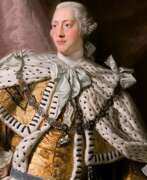Monarchs 18th century
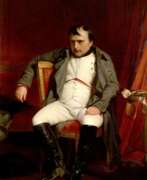

Napoleon I Bonaparte was a French statesman and military leader, Emperor of France (1804-1815).
Napoleon was born in the family of an ignorant Corsican nobleman, graduated from the Brienne military school, then the Paris military school. In 1785 he began military service in the rank of junior lieutenant of artillery in the Royal Army. From the first days of the Great French Revolution of 1789-1799 Bonaparte joined the political struggle on the island of Corsica, in 1792 in Valence joined the Jacobin Club and actively participated in all the turbulent political and military events.
In November 1799 Napoleon was at the head of a coup d'état: the government of the Directory was deposed, and the French Republic was headed by three consuls, the first of whom was Napoleon. In June 1804 Bonaparte was proclaimed Emperor Napoleon I of France, and in December a lavish coronation ceremony took place. After Italy recognized him as its king, in March 1805 he was also crowned in Milan.
With his rise to power, France entered a period of almost continuous warfare. Napoleon greatly expanded the territory of the empire, made most of the states of Western and Central Europe dependent on France. His brothers became kings: Joseph in Naples, Louis in Holland, and Jerome in Westphalia. In 1812, Napoleon made a campaign against Russia and even reached Moscow, but the Russian troops under the leadership of commander M.I. Kutuzov with the active support of all the people completely defeated the "invincible army". This military campaign was the beginning of the collapse of Napoleon's empire. The entry of the anti-French coalition troops into Paris in March 1814 forced Napoleon I to abdicate (April 6, 1814).
Napoleon retained the title of Emperor and was given possession of the island of Elba in the Mediterranean Sea. However, in March 1815, the deposed emperor at the head of a small detachment suddenly landed in the south of France and three weeks later, without a single shot entered Paris. But the emperor failed to live up to the hopes of the people of France, plus his defeat at the Battle of Waterloo all led to his second abdication. As a result, Napoleon Bonaparte was exiled to the island of St. Helena in the Atlantic Ocean, where he died on May 5, 1821.
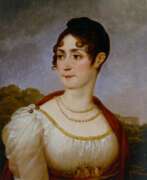

Joséphine de Beauharnais, born Marie Josèphe Rose Tascher de La Pagerie, was Empress of France from 1804 to 1809, the first wife of Napoleon I.
At the age of 16, Rose came to France to marry a young officer, Alexandre de Beauharnais. However, after the birth of their two children, the couple separated but maintained a relationship. During the French Revolution, her husband, who served in the revolutionary army, was guillotined in June 1794. Rose herself was imprisoned, but after the coup d'état of July 27, which ended the terror, she was released.
She was soon introduced to General Napoleon Bonaparte, and although she was a poor widow with two children, he was charmed and married her in a civil marriage in 1796. He and began to call her Josephine. She was with him all the way from general to First Consul and in May 1804 to Emperor of France. However, Josephine failed to produce an heir, prompting Napoleon, in the interest of the country, to divorce her in 1809. Retaining the title of empress and queen, she went to live at Château Malmaison near Paris and then at her Château of Navarre in Normandy, where she died in 1814, a few weeks after Napoleon's abdication.
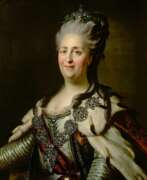

Ekaterina II, Ekaterina the Great; née Sophie Auguste Frederike von Anhalt-Zerbst-Dornburg, in Orthodoxy Ekaterina Alekseevna, was the Russian Empress and Sovereign of All Russia, mother of Emperor Paul I.
She was a niece of Swedish King Adolf Friedrich and a great-niece of Prussian King Frederick the Great. Sophie was a niece of the Swedish King Adolf Friedrich, and a great-niece of the Prussian King Frederick the Great. In 1744, at the invitation of Russian Empress Elizabeth Petrovna, she and her mother came to Russia, embraced Orthodoxy and was baptized with the name Ekaterina Alekseevna, and in 1745 married Grand Duke Peter Fyodorovich, the future Emperor Peter III. Immediately after arriving in Russia, Ekaterina II began to study the Russian language, history, and Russian traditions. She also read the works of the French enlighteners and works on philosophy, jurisprudence and economics, becoming a supporter of the ideas of the Enlightenment.
After the accession to the throne of Peter III, Ekaterina's relations with her husband deteriorated. Because of the threat of arrest and possible expulsion, Ekaterina decided to participate in the coup d'état, relying on the support of the Orlov brothers, Counts N. Panin and K. Razumovsky. On the night of June 28, 1762 Catherine secretly arrived in St. Petersburg and in the barracks of the Izmailovsky Regiment was proclaimed autocratic empress.
In the first years of her reign, Ekaterina II reformed the Senate, secularized church lands, which replenished the state treasury and alleviated the situation of a million peasants, abolished hetmanism in Ukraine, invited foreigners to Russia for the development of the Volga and Black Sea region. The Empress carried out important transformations in the military, social and financial spheres.
During her reign, Ekaterina II conducted two successful Russian-Turkish wars in 1768-1774 and 1787-1791, as a result of which Russia finally gained a foothold on the Black Sea. Having led an alliance with Austria and Prussia, Ekaterina participated in three partitions of Poland. In 1795, the empress issued a manifesto on the annexation of Courland to the Russian Empire. At the end of the 1780s, simultaneously with the Russo-Turkish war, the war with Sweden began, and in 1790 a peace treaty was signed, ending the Russo-Swedish war. In 1792 the Peace of Iasi was concluded, which consolidated Russia's influence in Bessarabia and Transcaucasia, as well as the annexation of Crimea.
Under the rule of Empress Ekaterina the Great, a whole pleiad of outstanding statesmen, military leaders, writers and artists appeared. Among them are Adjutant General I.I. Shuvalov, Generalissimo A.V. Suvorov, Field Marshal General G.A. Potemkin; enlightener, book publisher N.I. Novikov; historian, archaeologist, artist, writer, collector A.N. Olenin, President of the Russian Academy E.R. Dashkova.
Ekaterina II was buried in the vault of the Peter and Paul Cathedral. After 77 years in St. Petersburg on Alexandrinskaya Square was inaugurated a monument to the great empress. In the history of Russia she rightfully entered first of all as an enlightener.
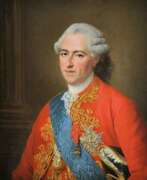

Louis XV, known as Louis the Beloved (French: le Bien-Aimé), was a king of France of the Bourbon dynasty who reigned from September 1, 1715 until his death on May 10, 1774.
Louis was the great-grandson of King Louis XIV (reigned 1643-1715) and the son of Louis, Duke of Burgundy, and Marie-Adelaide of Savoy. Because his parents and his only surviving brother died in 1712, he became king at the age of five years after the death of Louis XIV (September 1, 1715). Until he came of age in February 1723, France was ruled by a regent, Philip II, Duke of Orleans.
Louis was a gutless and lazy ruler; he lived an intra-palace life of mistresses, while his government degenerated into a faction of scheming ministers and courtiers. In 1745 the king declared Jeanne-Antoinette Poisson, Marquise de Pompadour, his official mistress, whose political influence lasted until her death in 1764.
Louis XV was not entirely passive; he introduced a complex system of secret diplomacy and intrigue into Europe in an attempt to play his own political game. However, all his efforts did not lead to the desired result, and even on the contrary. For example, in 1763 France lost in favor of the British almost all of its colonial possessions in North America and India. In an attempt to strengthen his authority within the country, the king introduced reforms in government and legislation, but in the end his fruitless reign contributed to the decline of royal power, which led to the outbreak of the French Revolution in 1789.
Louis XV's long reign was marked by a decline in the moral and political authority of the crown, as well as failures in foreign and military affairs. The king died in 1774, hated by his citizens as much as Louis XIV.
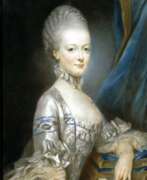

Marie Antoinette of Austria, born Maria Antonia Josepha Johanna von Habsburg-Lothringen - Queen of France and Navarre, wife of King Louis XVI of France.
Marie Antoinette was the daughter of Emperor Franz I Stephen and Maria Theresa, Empress of Austria. Her marriage to the heir to the throne of France took place in Versailles on May 16, 1770, when she was only 14 years old, and in 1774 Louis XVI ascended to the throne. The couple were not happy together, and Marie Antoinette led a luxurious and very wasteful lifestyle, patronizing favorites and little interest in politics.
During the political crises of 1789 it was Marie Antoinette who became the main target of revolutionaries. Trying to preserve the monarchy, she became an opponent of the constitutional-democratic regime. In October 1789, popular pressure forced the royal family to return from Versailles to Paris, where they became hostages of the revolutionary movement. In June 1791, friends from abroad organized the escape of the king and queen from Paris, but the revolutionaries detained them in Varennes and brought them back to Paris.
After France declared war on Austria in April 1792, Marie Antoinette's intrigues with the Austrians further enraged the French. Hatred of the queen prompted the storming of the Tuileries Palace and the overthrow of the monarchy on August 10, 1792. Marie Antoinette spent the rest of her life in prison. Louis XVI was executed by order of the National Assembly in January 1793, and the queen was brought before the Revolutionary Tribunal on October 14, 1793, and two days later was also executed.
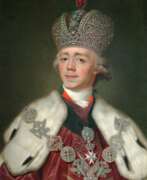

Paul I, Emperor of All Russia, a member of the Holstein-Gottorp-Romanov dynasty, son of Catherine II and Peter III.
He came to the Russian throne on November 6, 1796 after the death of his mother - Empress Catherine II. And the first thing he did was to demonstrate to the world that he would conduct his own policy, releasing from prison all those whom his mother had sent there, and putting his own people in key positions in the state. Everything that was associated with the name of Catherine II, Paul sought to destroy and oblivion. Then Paul engaged in monetary and military reforms, serious transformations were subjected to state administration and class policy, the situation of the peasants. The emperor also interfered in the daily life of his subjects, issuing decrees even on what clothes can be worn and what dances to dance.
In foreign policy, Paul I became famous for fighting the ideas of the French Revolution. He introduced the strictest censorship in book publishing, banning French books as well as fashion. During Paul's reign, thanks to the commander Alexander Suvorov and Vice-Admiral Fyodor Ushakov, the Russian army and navy achieved remarkable victories, cooperating with Prussian and Austrian forces. However, later the emperor showed his fickle character, broke off relations with his allies and formed an alliance with Napoleon, making peace with France in 1801, which eventually led to unfortunate consequences for Russia.
The reign of Emperor Paul I lasted only four and a half years, but in general left a very controversial trace in the history of Russia and ended with his assassination as a result of a palace conspiracy. Historians still debate whether he was a despot and autocrat or a reformer unappreciated by his contemporaries.
